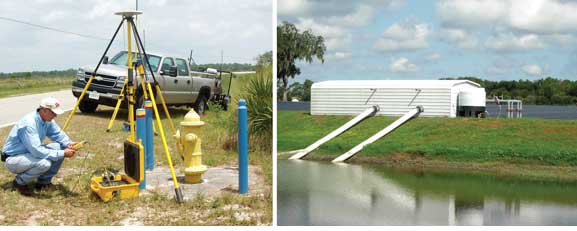 Left: Randy Freeman, civil engineering technician from the United States Department of Agriculture Natural Resources Conservation Service, works with the District to save farmers money and protect water resources. Above: The pond with the pump house is part of the plan the AGSWM team recommended for a strawberry field in Plant City.
Left: Randy Freeman, civil engineering technician from the United States Department of Agriculture Natural Resources Conservation Service, works with the District to save farmers money and protect water resources. Above: The pond with the pump house is part of the plan the AGSWM team recommended for a strawberry field in Plant City.
Because farmers have a unique set of surface water challenges, the District has developed a regulatory assistance exemption program that helps agriculturalists use water more efficiently, reduce runoff and prevent wetland impacts.
The District’s Agricultural Ground and Surface Water Management (AGSWM) program recognizes that surface water regulations for urban development do not work for farms and each farm has its own set of variables to consider when satisfying surface water regulations.
“Most farmers find out about the AGSWM program when they apply for a water use permit,” said Jeff Whealton, a senior agricultural environmental scientist on the District’s regional Ag Team.
The District’s AGSWM program works with the United States Department of Agriculture Natural Resources Conservation Service (NRCS) to help farmers plan their field layout and to suggest conservation techniques to implement.
The AGSWM process often starts with a visit from NRCS staff who conduct a survey of the proposed field. Once the slope of the land and locations where the water leaves the site are determined, NRCS can develop a site-specific plan called an RMS (Resource Management System) plan. This is a comprehensive, site-specific document package, which includes information such as site soil descriptions, pest and nutrient management recommendations, and a conservation plan.
This valuable service is provided at no cost to the farmer except for a minimal mandated processing fee. The RMS plan is used to apply for the exemption and is often used to satisfy some requirements of obtaining a water use permit.
Sam Astin, a Plant City strawberry farmer, uses the program every time he acquires a new field. Each field is about 15 to 40 acres. Astin currently plants about 400 acres of strawberries.
“The main advantages of working with NRCS and the District is the cost savings and the quality of work,” said Astin. “They’ve done this enough to know the best place to put your water sources and rows.”
Astin’s farm is an example of a permanent farm. However, the program also assists farms that fall into two other categories, ordinary and temporary. Ordinary farms include container growers, sod farms and citrus. Temporary farms include farmers who lease pastureland to grow crops such as watermelons, which can only be grown on a particular site once every three to five years. Once the crop is harvested, the land is allowed to go back to pasture.
Steve Reas grows watermelons in Hardee County. He tries to rotate to a new piece of land each year and has used the AGSWM program since the program began in 1991.
“It’s a simple process and the people are very helpful,” said Reas. “They don’t drag their feet, which is important because we are on a timetable to get our water use permits.”
The Ag Teams are another important part of the District’s AGSWM program. The District has an Ag Team for each permitting region. Their contact numbers are listed at the bottom of page 8. Each Ag Team includes an agricultural engineer, an environmental scientist and a water use permitting representative.
“One of the keys to the success of this program is putting people who are interested in agricultural-related issues and have the right skills on the Ag Teams,” said Mark Luchte, a District senior professional engineer.
Astin and Reas both agree that working with the District’s Ag Teams and the NRCS staff is a benefit. They say they enjoy working with people who understand their goals and needs.
To contact the Ag Team in your area, please call:
Bartow Regulation Region (Hardee, Highlands, Polk counties) (863) 534-1448 or 1-800-492-7862 (FL only)
Brooksville Regulation Region (Citrus, Hernando, Lake, Levy, Marion, Pasco, Sumter counties) (352) 796-7211 or 1-800-423-1476 (FL only)
Tampa Regulation Region (Hillsborough, Pinellas counties) (813) 985-7481 or 1-800-836-0797 (FL only)
Sarasota Regulation Region (Charlotte, DeSoto, Manatee, Sarasota counties) (941) 377-3722 or 1-800-320-3503 (FL only)
